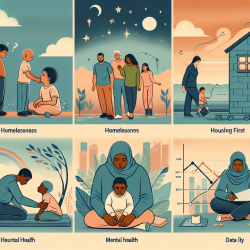Introduction
In the realm of speech-language pathology, the health and well-being of children are paramount. Recent research titled Does Health Insurance Eligibility Improve Child Health: Evidence From the National Health Insurance Scheme (NHIS) in Nigeria provides compelling evidence on the positive impacts of health insurance on child health outcomes. This study is particularly relevant for practitioners seeking data-driven strategies to enhance the health and developmental outcomes of children.
Understanding the Research
The study conducted in Nigeria used a difference-in-difference model to assess the impact of the National Health Insurance Scheme (NHIS) on child health. The NHIS was designed to increase access to affordable healthcare, and the findings suggest it has been effective in improving health outcomes for children. Key outcomes include increased birth weights and higher vaccination rates for polio and diphtheria, demonstrating the scheme's potential in enhancing child health.
Key Findings and Implications
- Increased Birth Weight: The study found that health insurance eligibility under the NHIS is associated with increased birth weights, a critical indicator of neonatal health and future development.
- Higher Vaccination Rates: Children covered by the NHIS had higher rates of receiving essential vaccinations, such as polio and diphtheria, which are crucial for preventing life-threatening diseases.
- Reduced Prevalence of Diarrhea: The NHIS expansion was linked to a significant reduction in diarrhea prevalence, a common and dangerous condition for young children in developing regions.
Applying Research to Practice
For speech-language pathologists and other practitioners working with children, these findings underscore the importance of advocating for comprehensive health insurance coverage as a means to improve child health outcomes. Here are a few strategies practitioners can consider:
- Advocacy: Encourage policies that promote health insurance coverage for children, emphasizing the long-term benefits of improved health and developmental outcomes.
- Collaboration: Work with healthcare providers and policymakers to ensure that children have access to necessary health services, including vaccinations and routine check-ups.
- Education: Educate families about the importance of health insurance and how it can improve their children's health and development.
Encouraging Further Research
While the study provides valuable insights, it also highlights the need for further research to explore the long-term impacts of health insurance on child development and educational outcomes. Practitioners are encouraged to engage in or support research efforts that continue to investigate these important areas.
Conclusion
The NHIS in Nigeria demonstrates the potential of health insurance to significantly improve child health outcomes. By integrating these findings into practice, speech-language pathologists can contribute to better health and developmental outcomes for children. To read the original research paper, please follow this link: Does Health Insurance Eligibility Improve Child Health: Evidence From the National Health Insurance Scheme (NHIS) in Nigeria.










